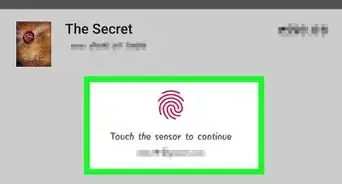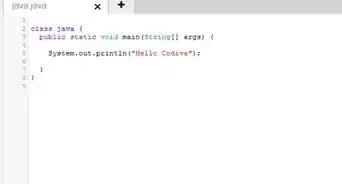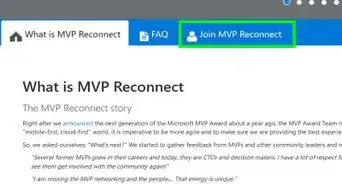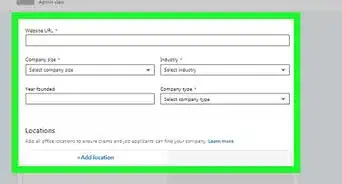This article was co-authored by Jonathan Soormaghen and by wikiHow staff writer, Amy Bobinger. Jonathan Soormaghen is a Career Coach and Founder of Resume Advisor, a career counseling firm that specializes in creating personalized products such as resumes, CVs, cover letters, and online branding tools to propel clients toward their next career milestone. Jonathan holds a BA in Political Economy from the University of California, Berkeley, where he was honored to serve as the Valedictory speaker of general commencement. Prior to founding Resume Advisor, he worked in management consulting and finance at companies including Accenture, Target, and Ernst & Young. Jonathan's clients have landed job offers from leading firms including Netflix, Google, Microsoft, Amazon, Facebook, Apple, Uber, Deloitte, KMPG, Accenture, and Merrill Lynch.
There are 9 references cited in this article, which can be found at the bottom of the page.
wikiHow marks an article as reader-approved once it receives enough positive feedback. In this case, several readers have written to tell us that this article was helpful to them, earning it our reader-approved status.
This article has been viewed 432,345 times.
If you love all things digital, information technology (or IT) might just be the perfect career for you. As an IT professional, you might work with computers, mobile devices, networks, web pages—the options are nearly endless. Even better, it's a rapidly-growing field, so you'll likely have opportunities to advance your career over time. We're here to answer your questions about how to break into the IT field and get the job of your dreams!
Things You Should Know
- While you don't need a college degree to launch your career in IT, many employers do require at least a bachelor's degree as a part of their hiring processes.
- If you don't have a degree, start by looking for entry-level help desk positions while you work on technical certifications in your spare time.
- Data storage (cloud computing, in particular), information security, health, and financial technologies are all knowledge areas in high demand.
Steps
Can you get an IT job without a degree?
-
1Sometimes, but you'll probably need to be certified. You may be able to get an entry-level position in the IT field if you pass a certification exam that shows you have the skills for that job. There are a number of technical certification programs to choose from—look for one that matches the knowledge you already have and the career path you want to follow.[1]
-
2Try getting a help-desk job to get started. A lot of people start out their career in IT working in customer support. While some positions do require a degree or certification, in some cases, just taking a few college-level computer classes might be enough. From there, you may be able to work up to into other IT positions, like working as a network administrator.[2]
- In addition to being computer-savvy, you'll also need to have good problem-solving and customer service skills.
Advertisement -
3Tailor your resume carefully to the job. Since you may still be competing against candidates with a bachelor's degree, it's important that you use your resume to show employers why you're right for the job. Carefully read through the job listing, looking for any requirements that match your resume. Then, emphasize those in your job application and your interview—that will help you stand out. Also, whenever possible, back up claims on your resume with concrete accomplishments.[3]
- For instance, if the job listing includes something like, "Use tools to analyze and resolve technical problems," you might mention that at your last job, you successfully helped your boss troubleshoot the printer network.
Expert Q&A
Did you know you can get expert answers for this article?
Unlock expert answers by supporting wikiHow
-
QuestionHow do I get a job in information technology?
 Jonathan SoormaghenJonathan Soormaghen is a Career Coach and Founder of Resume Advisor, a career counseling firm that specializes in creating personalized products such as resumes, CVs, cover letters, and online branding tools to propel clients toward their next career milestone. Jonathan holds a BA in Political Economy from the University of California, Berkeley, where he was honored to serve as the Valedictory speaker of general commencement. Prior to founding Resume Advisor, he worked in management consulting and finance at companies including Accenture, Target, and Ernst & Young. Jonathan's clients have landed job offers from leading firms including Netflix, Google, Microsoft, Amazon, Facebook, Apple, Uber, Deloitte, KMPG, Accenture, and Merrill Lynch.
Jonathan SoormaghenJonathan Soormaghen is a Career Coach and Founder of Resume Advisor, a career counseling firm that specializes in creating personalized products such as resumes, CVs, cover letters, and online branding tools to propel clients toward their next career milestone. Jonathan holds a BA in Political Economy from the University of California, Berkeley, where he was honored to serve as the Valedictory speaker of general commencement. Prior to founding Resume Advisor, he worked in management consulting and finance at companies including Accenture, Target, and Ernst & Young. Jonathan's clients have landed job offers from leading firms including Netflix, Google, Microsoft, Amazon, Facebook, Apple, Uber, Deloitte, KMPG, Accenture, and Merrill Lynch.
Career Coach Make sure your resume is tailored as much as possible to the actual job description. If there are technical requirements that you meet or are even willing to learn, go ahead and list them. Lastly, try to draw a concrete connection between actions you took and what they achieved. For instance, if you managed marketing campaigns, a proper bullet would say "managed 20 plus marketing campaigns with budgets of up to $1 million, which resulted in 20% to 30% growth in social media following," not simply "managed marketing campaigns." Showing action and results is key.
Make sure your resume is tailored as much as possible to the actual job description. If there are technical requirements that you meet or are even willing to learn, go ahead and list them. Lastly, try to draw a concrete connection between actions you took and what they achieved. For instance, if you managed marketing campaigns, a proper bullet would say "managed 20 plus marketing campaigns with budgets of up to $1 million, which resulted in 20% to 30% growth in social media following," not simply "managed marketing campaigns." Showing action and results is key. -
QuestionWhere should I start if I want to develop software?
 Community AnswerGet Linux. Then start using the Shell, use Bash, not zsh. Zsh teaches bad programming habits with its autocompletion that can cause terrible mistakes if you don't know what you're doing. Then learn C++ and Ruby. Just start at the base (the shell) then learn higher level languages. Then go back later and learn some assembly code.
Community AnswerGet Linux. Then start using the Shell, use Bash, not zsh. Zsh teaches bad programming habits with its autocompletion that can cause terrible mistakes if you don't know what you're doing. Then learn C++ and Ruby. Just start at the base (the shell) then learn higher level languages. Then go back later and learn some assembly code. -
QuestionWill IT courses be hard to a person who loves computers but does not have any formal IT knowledge?
 Eric ChathamCommunity AnswerThis depends on the person's aptitude and skill level with computers.There is a very broad spectrum of fields and subsets within IT such as programming, networking, and hardware. Some people who are more geared towards math may be better at programming, and people who are more technically minded may be better at hardware, such as building servers or PCs. Remember you can always enroll in an introductory IT course.
Eric ChathamCommunity AnswerThis depends on the person's aptitude and skill level with computers.There is a very broad spectrum of fields and subsets within IT such as programming, networking, and hardware. Some people who are more geared towards math may be better at programming, and people who are more technically minded may be better at hardware, such as building servers or PCs. Remember you can always enroll in an introductory IT course.
References
- ↑ https://www.cio.com/article/3309576/10-best-entry-level-it-certifications-to-launch-your-career.html
- ↑ https://www.bls.gov/ooh/computer-and-information-technology/computer-support-specialists.htm#tab-4
- ↑ Jonathan Soormaghen. Career Coach. Expert Interview. 7 October 2020.
- ↑ https://www.cio.com/article/3309576/10-best-entry-level-it-certifications-to-launch-your-career.html
- ↑ Jonathan Soormaghen. Career Coach. Expert Interview. 7 October 2020.
- ↑ https://www.cio.com/article/3309576/10-best-entry-level-it-certifications-to-launch-your-career.html
- ↑ https://www.forbes.com/sites/forbestechcouncil/2018/03/16/14-traits-you-want-to-look-for-in-a-top-tech-hire/?sh=75b021572ec5
- ↑ https://www.bls.gov/ooh/computer-and-information-technology/home.htm
- ↑ https://www.bls.gov/ooh/computer-and-information-technology/home.htm
- ↑ https://www.usnews.com/education/online-education/information-technology-bachelors-degree
- ↑ https://www.bls.gov/ooh/computer-and-information-technology/home.htm
- ↑ https://www.bls.gov/ooh/computer-and-information-technology/home.htm
- ↑ https://www.healthit.gov/faq/i-am-interested-career-health-information-technology-where-can-i-learn-more-about-health-it
About This Article
If you love using computers and solving puzzles, a career in information technology might be for you! You can expand and develop your IT skills by learning to solve your own problems and work independently. Reach out to professionals in the field to see if they can help you get started or give you pointers. When you’re ready, search online for “IT certification programs near me” and sign up for one you like. Pair your certification with a bachelor’s degree in IT to really stand out! To learn more about getting an internship or a job in IT, keep reading!


































































